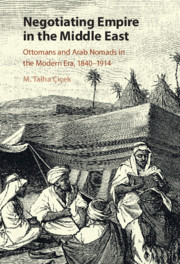Book contents
- Negotiating Empire in the Middle East
- Negotiating Empire in the Middle East
- Copyright page
- Dedication
- Contents
- Figures
- Maps
- Acknowledgements
- Note to the Reader
- Abbreviations
- Introduction
- 1 Conflict
- 2 Reinforcement
- 3 Expansion, Reaction and Reconciliation I
- 4 Expansion, Reaction and Reconciliation II
- 5 Partnership, Provincialization and Conflict
- 6 Taxation
- 7 Justice
- Conclusions
- Bibliography
- Index
3 - Expansion, Reaction and Reconciliation I
Establishment of the Deir al-Zor Mutasarrıfate and Reconciliation with the Fid’an and Deir al-Zor’s Shammar
Published online by Cambridge University Press: 08 July 2021
- Negotiating Empire in the Middle East
- Negotiating Empire in the Middle East
- Copyright page
- Dedication
- Contents
- Figures
- Maps
- Acknowledgements
- Note to the Reader
- Abbreviations
- Introduction
- 1 Conflict
- 2 Reinforcement
- 3 Expansion, Reaction and Reconciliation I
- 4 Expansion, Reaction and Reconciliation II
- 5 Partnership, Provincialization and Conflict
- 6 Taxation
- 7 Justice
- Conclusions
- Bibliography
- Index
Summary
Chapter 3 analyses another process which brought about empire-tribe reconciliation. This was the policy of expansion towards Deir al-Zor. The forward imperial policy was successful in expanding government authority in the frontier regions and the desert, notwithstanding that it did not take place in the way its planners envisaged, and brought about the consolidation of the state-tribe partnership while it ‘provincialized’ the Anizah and Shammar. The expansion of Ottoman direct rule towards Deir al-Zor created important reasons for the reconciliation. The reinforcement of Ottoman rule in this territory could not limit the tribal movement in these areas, but made the new administrative units dependent on nomadic collaboration. Now the Ottomans were in the tribal regions while the tribes still maintained their supremacy in the imperial countryside. As a result, the Ottoman strategy towards the nomads evolved from ‘expulsion’ into ‘containment’ in these regions as the regular troops served only as security providers and nomadic ‘goodwill’ was required for the maintenance of the new settlements. Following the consolidation of the mutasarrifate in Deir al-Zor, the Anizah branches such as the Fid’an, Seb’a and the Shammar under Faris al-Jarba’s sheikhship became the partners of empire. The expansion increased ‘mutual dependence’ and systematized the state-tribe partnership.
- Type
- Chapter
- Information
- Negotiating Empire in the Middle EastOttomans and Arab Nomads in the Modern Era, 1840–1914, pp. 99 - 131Publisher: Cambridge University PressPrint publication year: 2021



